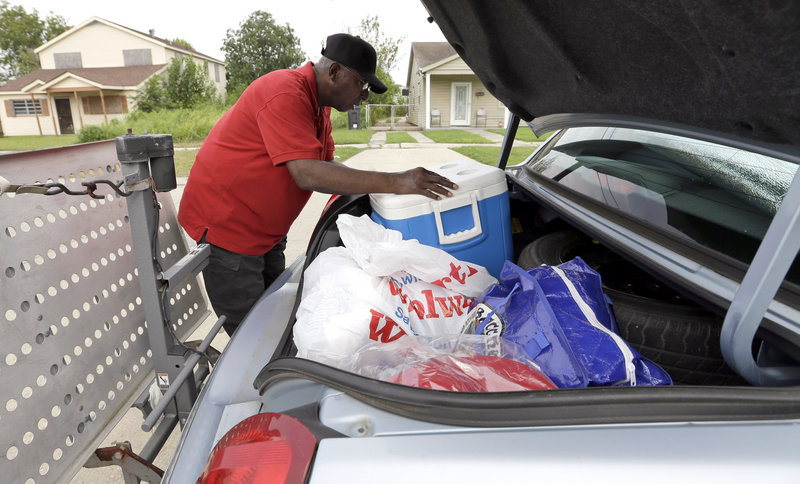NEW ORLEANS — As she loaded supplies into her car to prepare for Hurricane Isaac, Linda Grandison’s mind rewound to the nightmare of Katrina: Back in 2005, she had to flee her family’s flooded home and waited on a bridge for more than three days before being rescued by helicopter.
Though Isaac is far less powerful than the historic hurricane that crippled New Orleans, the system was on an eerily similar path and forecast to make landfall on the seventh anniversary of Katrina, raising familiar fears and old anxieties in a city still recovering from a near-mortal blow seven years ago.
This time, Grandison is not taking any chances. She will stay with her mother in the New Orleans suburb of Gretna, which did not flood in Katrina. The house has a generator to keep the refrigerator running if power goes out, and she has enough charcoal to grill out for days.
“You can’t predict God’s work. This is nerve-wracking,” she said. “I hate leaving my house, worrying if it’s going to flood or get looted. But I’m not going to stay in the city again.”
If Isaac comes ashore here, it will find a different city than the one blasted by Katrina. This New Orleans has a bigger, better levee system and other improvements designed to endure all but the most destructive storms. Many neighborhoods have rebuilt. Some remain desolate, filled with empty, dilapidated homes.
The Army Corps of Engineers was given about $14 billion to improve flood defenses, and most of the work has been completed. Experts say the city can handle a storm comparable to a Category 3 hurricane. Isaac is expected to come ashore as early as Tuesday night as a Category 1 storm, striking anywhere from west of New Orleans to the Florida Panhandle.
Mayor Mitch Landrieu said he understood residents’ worries, but tried to reassure them that the city was prepared.
“I think everything will be OK,” he said.
But people in this city aren’t easily soothed because they’ve never forgotten the images of families stranded at the decrepit Louisiana Superdome, people begging for help at the convention center, and President Bush’s back-slapping congratulatory remarks to then-FEMA Director Michael Brown.
Shawanda Harris lost everything she owned when her ground-floor apartment in low-lying eastern New Orleans was flooded during Katrina. She was on the phone with family and friends Monday as she waited for the latest update on Isaac from the mayor. The neighborhood was packing up and leaving.
Harris planned to caravan out of the city with relatives and head inland to another family house outside New Orleans.
“People ain’t taking chances now,” she said, keeping an eye on a television that was swarmed with the radar images of Isaac looming over the Gulf of Mexico.
Harris said the preparations were bringing back a lot of unease and heartache reminiscent of 2005.
“It was scary. My whole family was separated. They couldn’t find me. The Red Cross had called and told my mom that they found me dead,” she recalled.
She said Isaac was coming — just as Katrina did — at the end of the month, when many people are low on money.
“They got rent to pay. They got bills. Payday isn’t until the end of the month, Friday,” she said. “Right now, half our family got money. Some of our family got nothing. That’s why we’re leaving together.”
Others tried to have confidence that the city was prepared and that the levees would hold.
“I’m not kidding myself. We’re going to have wind, going to have water. But not Katrina destruction. I think things are going to hold,” said Erin Ogg, who planned to ride out the storm at her New Orleans home.
In the quiet coastal town of Long Beach, Miss., Brenda Johns and her neighbor, Willie Shook, took time Monday to pray that Isaac won’t deal the devastating blow that Hurricane Katrina did. Then they got busy boarding up their homes. The women are two of only three people who rebuilt on their street after Katrina wiped their neighborhood away.
One of the only things Shook recovered was a dress, which she found still on a hanger in a tree near her destroyed house.
“Katrina changed a lot of people, for good or bad,” said Shook, a retired assistant principal. “It changed me for the better. It showed me that we don’t really own anything. God gives it to us, and he can take it away. I’m at peace.”
Send questions/comments to the editors.



Success. Please wait for the page to reload. If the page does not reload within 5 seconds, please refresh the page.
Enter your email and password to access comments.
Hi, to comment on stories you must . This profile is in addition to your subscription and website login.
Already have a commenting profile? .
Invalid username/password.
Please check your email to confirm and complete your registration.
Only subscribers are eligible to post comments. Please subscribe or login first for digital access. Here’s why.
Use the form below to reset your password. When you've submitted your account email, we will send an email with a reset code.